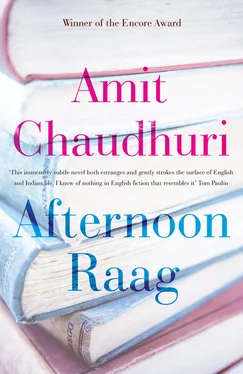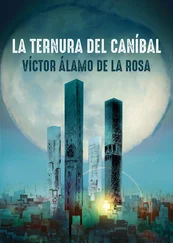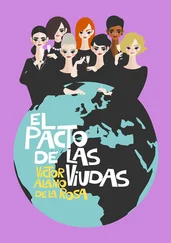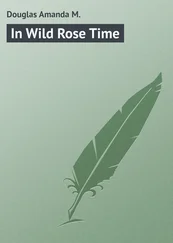To that strain of worship my father’s family belongs. Dispersed though they were over Eastern and Northern India, from Cachhar to Brindaban, rarely in contact with each other, second cousins and third cousins and uncles, some dead, uprooted from tradition, a refugee people, I would hear of singers and painters in every branch of the family, and once, on a visit to a remote part of India when I was a child, I received blessings and a book of poems from my father’s aunt; it was a book she had written herself. That family, perhaps because once so rich, was little in touch with education; my father’s aunt had never been to school; her Bengali was self-taught. Their love of poetry was not created by the new secular reverence for culture and literature that came with Tagore, but was an indigenous offshoot of a long line of ecstatic worship and craftsmanship. Not very long ago, in the summer, after my parents had moved to Calcutta, we made a trip to where my father’s aunt’s son now lived, with his sister and her daughter, in a barely recognizable lane off a small road beyond the highway at Dum Dum. They were overjoyed to see us; on the veranda to the small house, canvases rested, portraits of saints and holy men and women. My cousin was an artist, and all his paintings were devotional. On the veranda there was a table on which there were lumps of clay that looked like turds but became, on closer inspection, little animals, bulls, cows, and images of Krishna. These my cousin took me by my hand to show me proudly. Knowing my love of music, he had taken out harmonium and tablas, and urged me and my mother to sing. Then they themselves sang with little prompting, from a vast repertoire of songs in both Hindi and Bengali, some of which they had composed themselves. An anxious, child-like joy in their own creations lived in that house. In a room at the back, my cousin was working upon a commissioned sculpture of a living saint; made from clay, to life-like measurements, sitting crosslegged upon newspapers spread out on a table, it was an ecstatic moulding for worship. Creation was worship; that family was excited and full of love for that image; they had made it together, my cousin doing the sculptor’s work while his sister and her child helped him to hold it still and achieve its proportions. It was still unpainted, its colour the colour of clay, but the eyes of the saint and the expression of his face and body no longer belonged to earth and mud but to the realm of the imagination. For the first time I could see where my own private joys came from — the love of songs, of music, of pride and delight in creation. That delight is my family’s gift.
Cowley Road, Iffley Road, and St Clement’s — small, mean, jaunty families live here side by side with the Bangladeshis and Pakistanis. This is the tribe that belonged to Dickensian alleys, the aboriginal community that led its island-life, its daily routines and struggles, and scarcely heard of Empire or took part in governance. For them the supermarkets were built, to work in and to shop at. Not Sainsbury’s, but Tesco, with its long aisles of shopping trolleys, sides of beef and ham, frozen chips, mango chutney, and spinach at tuppence less. Towards such centres they gravitate, living in a perpetual present, and then walk home to their houses with tiny gardens. Not for them history, old buildings, literature, but an England of small comforts and marriages, happy or unhappy. For them, television, with endless runs of EastEnders and Coronation Street , showing them their lives and those of their children. There is a church here, in Cowley, for they are devout Christians, drinking Protestants, religious not in a theological but in a family way, with roles allocated to the sexes, the men believing, and supporting their football team, the women praying, and going out shopping, all of them seeming to know the words of the Sunday hymns by heart, but blaspheming and cursing God when they feel like it. Speaking an English that is hardly spoken in any other part of the world any more, with queer proverbs and turns, dropped consonants and vowels, turning the language like meat inside their mouths.
For them the cans of beer with German names, and black Guinness. Turners of nuts and bolts, sweepers of a clean country, the young men white and unnaturally fat on baked potatoes and Cheddar cheese, still pathetically dependent on their mothers, the women wearing dresses, their feet either in high-heels or sandals in the cold, their legs unstockinged in winter, secretly shaved, with faint blue and purple veins, the older men with long, combed, wavy hair, wearing coats and flared trousers, seldom unshaven, never tying their hair in a pony-tail like the students, rarely seen in corduroys, the last chain-smokers and meateaters of England, thin, smartly dressed, energetic, hanging around street-corners, escaped from their wives and children, looking like snooker-players, white men leading black lives. White niggers, they fought the war, sang drinking songs, married, died. Not for them cars, but the great public transport system, joining and holding communities and families together, the buses coming every twenty minutes. They are the ones who lived in a world of horrible and immediate prejudices, coined the terms ‘Paki’ and ‘wog’, and then lived side by side with the Patels and Muslim Bangladeshi families, and worked for their sons who look like Latin Americans and chatter in Cockney amongst themselves. For them a diet of Brain’s faggots and frozen peas, the middle-aged skinheads, in the nineties, become fathers with children perched on their shoulders, the punks, with their phosphorescent hair, vanished like a seasonal insect. For them, recreation is the desolately green area of the Headington Parks, pleasure a public piss in a public toilet, and misery an hour spent in the launderette. This world is a different world from that of the University; they never meet. The state of intoxication here, broken bottles, a beggar’s foul breath, is more basic than the students’ social drunkenness, a state of the soul.
Whenever I have come here, it has rained. Clouds gather at this end, little England. The city centre is charming, like a picture, and the lanes off Broad Street, off Jesus and Lincoln colleges, are romantic and small, eighteenth-century exteriors with twentieth-century fittings, romantic lamplight and mist. But here even the pubs are different. Once, finding myself at this end of town, out on an edge, I entered one; it was a weekday. It was quiet and uncrowded; people seemed to have gathered here as a matter of course, as if it were a second home; they noticed me, but said nothing. Bright wallpaper on the walls; tables and chairs; coffee was served; an old man sat in a chair by a window and the entrance, ignoring a draught, ignoring newcomers, a large Alsatian dog by his side, his only companion. It must have been nine o’clock, and yet the pub was relaxed and half-empty. It had no designer photographs of old cricketers, no designer posters of old advertisements for the London Tube, for Coca-Cola, for the Festival Hall; its atmosphere belonged to itself; it was like an old house. The young men and women, couples talking with each other, looked different from the students; their hair was straight and limp; they had never been to the orthodontist as children; raised teeth, and lines around their mouths, gave their faces an odd softness. Their complexion, too, was white; they seemed like Madame Tussaud’s waxworks, a lost world, remade and fixed. And yet this was their world.
Sometimes, in the evening, I would be confronted by alcoholics who, for some reason, seemed least ill-at-ease when begging from a dark-skinned foreigner. If I parted with a coin, I would receive a ‘Thank you, sir’ in return, and if I refused, I would either be wished good luck or cursed for being in England. Once I was cursed for being a student by a beggar I had become friendly with: ‘There’s no difference between you and me, mate, we’re both dossing around on other people’s money.’ And I remember an elderly gentleman whom I saw both in Cowley and in North Oxford, drunk every time, a myopic who wore spectacles with a strong, dark frame that gave his face a learned look which in itself is an anachronism in a university town where most students wear contact lenses.
Читать дальше












